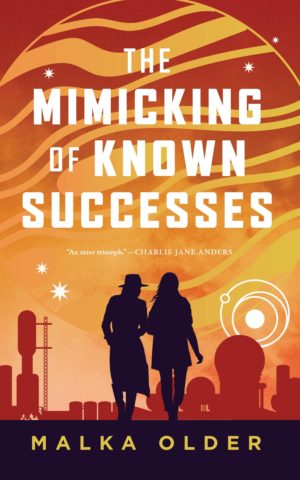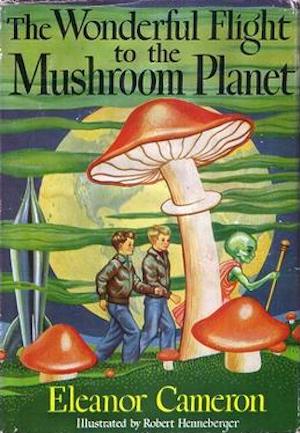In this bi-weekly series reviewing classic science fiction and fantasy books, Alan Brown looks at the front lines and frontiers of the field; books about soldiers and spacers, scientists and engineers, explorers and adventurers. Stories full of what Shakespeare used to refer to as “alarums and excursions”: battles, chases, clashes, and the stuff of excitement.
I was looking at some of the oldest books in my collection, a few of which I bought in elementary school from the Scholastic Book Club. There on the bookshelf, The Wonderful Flight to the Mushroom Planet, a 1954 novel by Eleanor Cameron, caught my eye. It immediately evoked happy memories of a homemade spaceship, a small and mysterious man who might not have been a man at all, and how a hen and her eggs ended up saving the day.
As I recollect, I first read The Wonderful Flight to the Mushroom Planet in a hardback edition, checked out from my local library…just thinking about that library evokes many happy memories, and I can almost smell the distinctive scent of lots of books in close proximity. I was so impressed with the story that I later used my allowance to buy a copy from a Scholastic Book Fair at my elementary school (my paperback indicates this edition was published in 1966). It might have been one of the first books I bought at a book fair, but was far from the last. I learned that you can find joy in books not just by reading them, but by owning them as well. I recently saw a Scholastic Books truck outside the local elementary school, and am glad they are still around.
The Wonderful Flight to the Mushroom Planet was a great success, a whimsical and engaging tale that made the reader feel like fantastic adventures could be lurking right around the corner. In fact, you could argue that the tale fits perfectly into a category that Diane Callahan, in a recent article for Tor.com, has dubbed as “curio fiction.”
About the Author
Eleanor Cameron (1912-1996) was born in Canada and emigrated to the United States at a young age, and was a librarian, literary critic, and author of twenty books. Her fictional writing was almost entirely devoted to books for young readers, and one of her fantasy adventures, The Court of the Stone Children, won the National Book Award in 1974—one of a number of awards and nominations she received during her career. Her longest series started with The Wonderful Flight to the Mushroom Planet, a novel that eventually had five sequels. That book was born out of a request from her own son David to write something that featured him as the main character.
Cameron was a librarian who worked for the Los Angeles Public Library and Board of Education. She took the issue of children’s literature very seriously, wrote two books on literary criticism, and regularly spoke and wrote in periodicals on the topic. She received attention for a three-part essay in The Horn Book Magazine entitled “McLuhan, Youth, and Literature,” in which she criticized some of the theories put forth by then-popular philosopher Marshall McLuhan, and was also critical of writer Roald Dahl.
Kids in Danger
One of the most effective ways of creating narrative tension is, of course, to put your protagonist into danger or a horrible situation, and then having them work their way out of it. I’ve heard several writers remark that often, the dire situation comes to them first, and the solution to that problem gets worked out by the seat of the author’s pants. Authors throw their protagonists into wars, natural disasters, shipwrecks, extreme weather, and other dangerous situations. They take away the stability offered by homes, food, health, money, jobs, family and loved ones. And it seems like the more dreadful the trials, the more satisfying it is to see the protagonist overcome them.
Writers of children’s fiction, however, must walk a delicate tightrope. Portraying children in danger can strike readers as unsettling or even offensive. Since parents are charged with protecting their children, putting those fictional children in danger can reflect badly on the adults in the story. And there’s always the concern that stories about children putting themselves into danger might give young readers the idea that they, too, could engage in hazardous or irresponsible behavior in the interest of excitement and adventure, heedless of real-world consequences.
Eleanor Cameron’s The Wonderful Flight to the Mushroom Planet certainly puts the boys David and Chuck into danger, sending them into space in a homemade spaceship at a time before any other humans had ever made such a trip. But the story mitigates this danger through the calming presence of the mysterious Mr. Bass. He may be eccentric, but the readers get the sense that he can perceive the future, and the fact that he is guiding the boys’ adventures, and equipping and improving their spaceship, tempers the apparent peril. There is enough risk to be exciting, but not so much that the reader is ever frightened the characters could lose their lives or suffer any injuries. Moreover, Mr. Bass’s interaction with the parents in the story seems to alleviate their concerns as well, and allows the boys to have their adventures without adult interference.
The Wonderful Flight to the Mushroom Planet
The book opens with David Topman’s father showing him a mysterious entry in the local newspaper, printed in green ink. It calls for a boy, and perhaps one friend, to build an eight-foot spaceship, and bring it to a local home. David immediately starts sketching, and before bedtime has a plan. Fortunately, Easter week vacation is just beginning, and David and his friend Chuck Masterson have time to begin the project, using boat-building materials and tools borrowed from Chuck’s grandfather, a retired mariner nicknamed Cap’n Tom.
Buy the Book


The Mimicking of Known Successes
The scene then shifts to the home of the mysterious Mr. Bass, who placed the advertisement in the newspaper in such a way that it will only be seen by exactly the right boy. He is working on the engine and fuel that will propel the ship on its journey to the tiny satellite Basidium-X, a mysterious blue-green world that can only be seen using a special telescope filter Mr. Bass developed himself. The tiny planet is only 35 miles in diameter, and Mr. Bass has no idea how such a small planet can support an atmosphere and the clouds that cover the tiny world. Mr. Bass also muses that the planet is the home of “his people,” although how this can be is not explained up front.
The boys find boat ribs and sheets of tin, and before long have fashioned a streamlined ship with an airtight door, a window at the bow, and fins on the tail. Chuck’s dad is suspicious of this whole endeavor, but after a visit to Mr. Bass, his objections, and those of all other adults in the story, mysteriously cease (leaving the adult me to wonder if Mr. Bass has some sort of mind-altering spores at his disposal). The two boys load their ship onto a wheeled cart and take it to Mr. Bass’ house. He is delighted at their efforts, coats the ship with a material that will protect it from the rigors of space travel and reentry, installs the motor and fuel, and equips it with an oxygen generator. (Cameron, while wanting her young heroes to build their own craft, has also given thought to making this journey somewhat plausible.) Mr. Bass is a peculiar creature; short, slim, and soft-spoken, with a large round head and large eyes. He tells David and Chuck of the planet he has discovered, and shows it to the boys using the private observatory built into his house. He wants them to leave on their journey this very night, departing at midnight!
Mr. Bass has some very specific instructions. The ship is automated, and will mostly fly itself. The boys must bring provisions, and Mr. Bass is very insistent that they must bring an animal mascot with them. He wants them to fill a mason jar with air from Basidium and bring it back to him. They grab the Topman family’s laying hen, and off they go. The journey to Basidium is a great adventure that goes entirely by the book. They arrive on the planet and meet two little mushroom people, Mebe and Oru, who look a lot like Mr. Bass. They are the wise men of the planet, but are bereft because they’re facing a looming disaster they can’t fix. The wise men take the boys to their leader, the Great Ta, who explains their problem. Plants that give the mushroom people vital nutrients have died, and unless they find an alternate source, their people will perish. The boys only have a few hours on the planet to help the mushroom people solve their crisis and fill their mason jar with air, all while a storm brewing back home will complicate their landing. From this point, the book gallops along with twists and turns galore—and just when Chuck and David think their adventures are over, Mr. Bass mysteriously disappears, leaving his house, with its laboratory and telescope, to the boys. It is a neat little ending that feels complete and satisfying, but also leaves room for future adventures.
The Many Sequels
When I was young, I had no idea there was a whole series of Mushroom Planet books, which in addition to the original include Stowaway to the Mushroom Planet (1956), Mr. Bass’s Planetoid (1958), A Mystery for Mr. Bass (1960), Jewels from the Moon and The Meteor That Couldn’t Stay (1964, two shorter stories set in the same world as the other books), and Time and Mr. Bass (1967). Some of the books were used in classrooms, with lesson guidance and discussion questions included.
Having no idea the books even existed, I cannot comment on the sequels, but in addition to reviewing The Wonderful Flight of the Mushroom Planet for Tor.com in 2014, Mari Ness also looked at Stowaway to the Mushroom Planet and Mr. Bass’s Planetoid, and Time and Mr. Bass. Reading her reviews, I am kind of glad I missed the sequels, as the adventures of David, Chuck, and Mr. Bass (along with his relatives) seem to have quickly become both less entertaining and less plausible in the sequels. And while there are many reviews of the original book on the internet, and quite a bit of praise, it is difficult to find much mention of the sequels at all.
Final Thoughts
When I read The Wonderful Flight to the Mushroom Planet as a young boy, I was captivated. Not only was it a good story in and of itself, but as I explored my neighborhood, and nearby woods and farms, I couldn’t help but think that I, too, might find exciting adventures lurking just around the corner from me. And as I re-read the book some six decades later, I found I enjoyed it again, but in a whole different way. I admired how the story was constructed, in a way that kept the reader thoroughly engaged, and how the scientific veneer was underlaid by a sense of magic and whimsy. Like many stories of its time, the tale is overwhelmingly male-oriented, something that I took for granted as a youth, but which seems archaic from today’s perspective.
And now I’d like to hear from you: If you’ve read The Wonderful Flight to the Mushroom Planet I’d enjoy learning how and when you encountered it, and what you thought of the book. And if there are other juvenile adventures of a similar nature you enjoyed, I’m interested in your thoughts on those, as well.
Alan Brown has been a science fiction fan for over five decades, especially fiction that deals with science, military matters, exploration and adventure.










